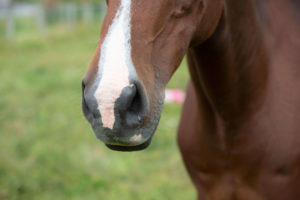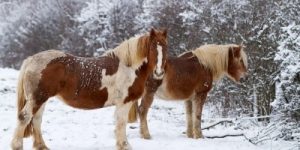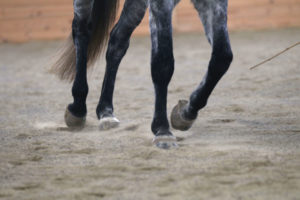This isn’t actually a review post, but I thought it would still be helpful information this time of year. When the snow starts flying, and the temperatures drop there are several things you need to watch for and keep in mind regarding the care of your horse. The first, and most obvious concern is that your horse is able to stay warm. Second, you need to be providing the calories he needs, but in the form that generates the most body heat. Third, horses tend to drink less in the winter, so keep an eye on his water consumption and encourage him to drink more. Finally, number four, examine your horses coat, skin, and legs, as long winter coats can conceal cuts or areas of swelling, and they also provide the perfect breeding ground for bacteria and fungus.
1 – Keep your horse warm – this includes providing adequate shelter for protection against wind and weather, as well as monitoring your horse and if he does not grow an adequately thick hair coat, put a blanket on him. See Blanketing for more on this.
2 – Your horse is burning more calories in the winter to generate body heat, so unless he is a very easy keeper, you will likely need to increase his ration of concentrated feed. (Concentrated feed means grain, sweet feed, pellets, fat supplements, etc.) The most important component of your winter feeding program; however, is hay. Hay is digested slowly, through a process called fermentation, which occurs in the hindgut of the horse. The fermentation process itself generates heat which helps maintain the horse’s body temperature. Feed lots of hay, especially for horses living outside. Even if there is grass still visible on the ground, it doesn’t have much nutritional content left. You are better off feeding large amounts of a lower quality hay and supplementing with higher quality hay if needed, then feeding only small amounts of high quality hay. This means feed lots of grass hay, and be more sparing with the alfalfa.
3- Monitor how much your horse is drinking. Make sure he has access to fresh, non-frozen water several times per day. For the horses that live out at my farm, we put heaters in their buckets to prevent them from freezing. For horses that live in stalls at my farm, their indoor buckets rarely freeze, plus we dump fresh water in outdoor buckets in the mornings they are frozen. If you feel your horse is not drinking enough (average for a horse is 10 gallons per day), you can add salt or electrolytes to his feed to make him thirsty, or you can feed beet pulp or bran mash. Both feeds are soaked with water, so they help provide additional hydration.
4 – Groom your horse thoroughly so you can spot any problems that are hiding under all that long hair. We talked about rain rot in this post, plus there are many other types of skin irritation that love long hair. As I mentioned before, it is also more difficult to spot injuries with a thick winter coat. Examine your horse regularly and you can nip problems in the bud!
Winter means more work for horse owners, but as long as you are attentive to your horse’s needs, he will be just fine and you can both enjoy frolicking in the snow!













